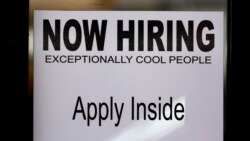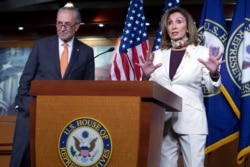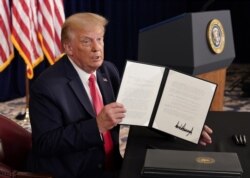The U.S. Labor Department reported Thursday that 860,000 workers filed for unemployment compensation last week, a slight improvement from the week before but an indication that the coronavirus pandemic continues to wreak havoc on the American economy.
Millions of workers remain unemployed in the United States, with the unemployment rate at 8.6% in early September, and economists saying the jobless figure could remain elevated for months. Only about half of the 22 million U.S. jobs lost in the pandemic have been recovered, with the world’s biggest economy adding 1.4 million jobs in August.
Weekly initial claims for jobless benefits seemed to have stabilized somewhat below 900,000 in recent weeks. Last week’s 860,000 figure was down 33,000 from the week before.
The recent weekly claims figures are well below the 6.9 million record number of claims filed in late March as the coronavirus swept into the United States but remain above the highest level before this year in records going back to the 1960s.
U.S. employers have called back millions of workers who were laid off during mandatory business shutdowns earlier this year, yet some hard-hit businesses have been slow to ramp up their operations again or have closed permanently, leaving workers idled or searching for new employment.
“We’re not done with the effects, the consequences of the pandemic,” White House economic adviser Larry Kudlow told reporters. “We’ve got a lot more work to do.”
Still, he said there has been “tremendous progress (in the economic recovery) of folks going back to work … and the unemployment rate coming down much lower and faster than almost anybody thought” would happen.”
During the worst of the pandemic, the U.S. unemployment rate topped out at 14.7% in April.
In politically fractious Washington seven weeks from November’s presidential and congressional elections, President Donald Trump and Republican and Democratic lawmakers have been unable to reach an agreement on extending federal unemployment benefits and how much should be paid.
Until the end of July, the national government sent an extra $600 a week to unemployed workers on top of less generous state jobless benefits. The Republican-controlled Senate a week ago tried to win approval of $300-a-week payments through the end of the year, but Democrats blocked the proposal as too small and have continued to call for resumption of the $600 weekly payments.
The rejected Republican coronavirus relief package would have cost between $500 billion and $700 billion, on top of the $3 trillion approved months ago at the height of the coronavirus pandemic in the U.S.
On Wednesday, Trump went against his Republican colleagues in Congress and urged them approve more spending in another coronavirus aid deal. He said on Twitter, “Go for the much higher numbers, Republicans, it all comes back to the USA anyway (one way or another!).”
The top two congressional Democrats, House Speaker Nancy Pelosi and Senate Democratic leader Chuck Schumer, praised Trump’s stance.
“We look forward to hearing from the president’s negotiators that they will finally meet us halfway with a bill that is equal to the massive health and economic crises gripping our nation,” Pelosi and Schumer said.
“By the end of the week, 200,000 Americans will have died from the coronavirus,” they said. “The lives and livelihoods of the American people depend on Republicans abandoning their obsession with doing as little as possible while the coronavirus rages through our nation.”
Democrats have called for a $2.2 trillion relief package, but possibly could settle for less than that. Whatever figure, if any, is agreed on is likely to come in the next two weeks. Lawmakers want to leave Washington soon to return to their home states for a month of campaigning for re-election ahead of the November 3 presidential and congressional elections.
As the first round of unemployment payments expired in July, Trump signed an executive order calling for $400 a week in extra payments for a few weeks. But not all states delivered the reduced payments to jobless workers, and now that money is running out.
The coronavirus pandemic has now killed nearly 197,000 people in the United States, according to Johns Hopkins University figures, and caused the economy to plummet.
While the U.S. has been adding more jobs in recent months, the pace of the recovery seemed to slow as a second wave of coronavirus infections in the U.S. surged in June and rose still more by mid-July, forcing employers to close their businesses again.
The 1.4 million jobs added in August includes the Census Bureau’s temporary hiring of about 240,000 workers to help conduct the once-a-decade count of the U.S. population.








